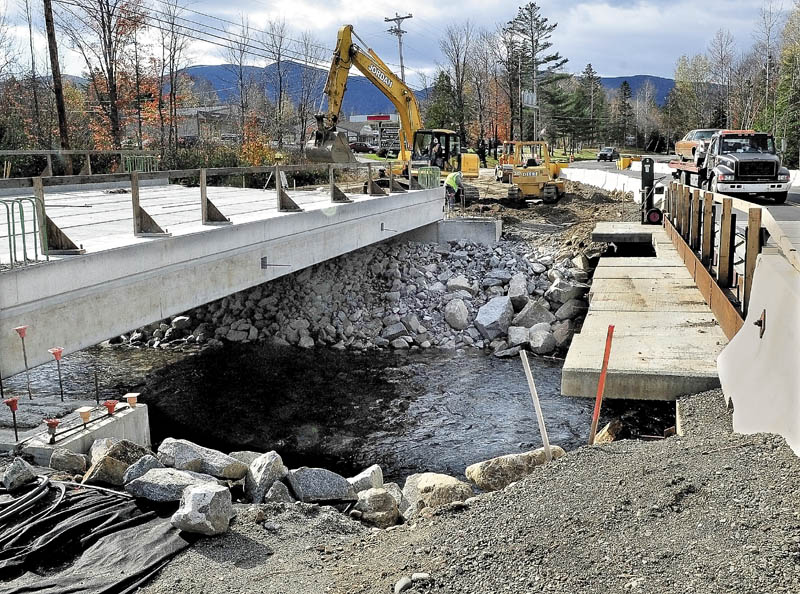CARRABASSETT VALLEY — A project under way to replace the two bridges destroyed by Tropical Storm Irene is costing taxpayers at least $576,000 more than normal so it can be finished before ski season starts, according to the Maine Department of Transportation.
The private contractor hired to meet the deadline is scrambling to build two new bridges on a small but vital stretch of Route 27, where the entrance to Sugarloaf Mountain Resort connects to the highway.
State transportation officials decided last month to spend the extra money to speed up construction, amid fears that the thousands of tourists drawn to the ski resort each winter may think twice about visiting Maine without the new bridges, according to Joyce Taylor, director of project development for the transportation department.
There was also concern about winter traffic making turns to cross the temporary bridges during bad weather, she said.
Building the two bridges will cost taxpayers $2.88 million, a project that could have been between 20 to 25 percent less if completed on a normal construction schedule, Taylor said.
“It was to accommodate the whole Sugarloaf area and recognized that it’s an economic development area for the state,” she said of the higher price.
Temporary bridges were already built that reopened the section of highway to traffic just nine days after the Aug. 28 storm. These structures, while not built to the same longevity and design standards as permanent bridges, would have allowed tourists to reach the resort.
After that project was finished, the transportation department was still getting a lot of phone calls about access to the resort, many from people asking about whether they will be able to drive there to go skiing, Taylor said.
These phone calls were a big reason for the decision to spend more tax dollars so the contractor, Reed & Reed Inc., could finish faster and address the confusion about the situation, she said.
“There was a great sense that Sugarloaf, that area, needed to look open for business,” Taylor said.
With the added funding, the new bridges are on pace to be open for the ski resort’s projected opening day on Nov. 18.
Without the extra spending, the bridge openings could have been delayed to late December, when weather conditions would have also threatened to push the project back until some time in April, missing the ski season entirely, Taylor said.
Ethan Austin, spokesman for Sugarloaf, praised the transportation department and contractor for responding to the storm damage so quickly.
Getting traffic flowing again with temporary bridges and having the permanent bridges open for the ski season is important to the resort’s success, he said Tuesday. In addition to skiing, there are condominiums and homes, a golf course and other seasonal attractions at the resort.
Although the temporary bridges could have provided access this ski season, the resort did have worries about snow delaying traffic and other access problems when more visitors started arriving around Thanksgiving, Austin said.
“It’s obviously very important for us to have traffic flowing normally,” he said.
The transportation department seldom approves spending more money to speed up construction projects, with the process calling for unique contracts and negotiations, Taylor said.
The bridge projects on Route 27 started after Gov. Paul LePage approved a fast-tracked contracting method for emergency storm repairs, allowing the transportation department to forgo the public bidding process to select the contractor.
After the approval, Reed & Reed Inc. of Woolwich was hired to build the temporary bridges and work started while negotiations over price continued, Taylor said.
The process consists of agreeing to certain industry standards and market costs for materials and labor before the work starts. Then state officials and the contractor enter into more detailed negotiations after the work is finished, with those negotiations currently ongoing for the temporary bridge project, Taylor said.
The same contractor was hired to build the permanent bridges after negotiating the $2.88 million price last month, Taylor said.
The temporary and permanent bridges meet the same safety standards for traffic, but differ in capacity and performance because of their materials, designs and expected longevity, according to Taylor.
They cross over Carrabassett River and Brackett Brook, the waterways just 300 yards apart that had floodwaters from Irene wash away the other bridges.
One of the bridges that collapsed had an antiquated design from the 1950s that made it more susceptible to fail during heavy flooding.
It was also scheduled to be repaired to address the problem within the next year.
State transportation officials determined that both bridges collapsed because the storm created extreme flooding, ranked as an event that happens once every 100 years.
Taylor said the new bridges are designed to be built in areas that have high water flows and a history of flash flooding.
The new bridge projects have applied for 80 percent in federal aid reimbursement for emergency storm repairs.
Taylor said that she expects the aid to be approved as part of the federal disaster relief approved for Maine, which is getting $1 million for certain highway repairs and reimbursed at a certain percentage for projects in the counties hit hardest by the storm.
David Robinson — 861-9287
drobinson@centralmaine.com
Send questions/comments to the editors.



Success. Please wait for the page to reload. If the page does not reload within 5 seconds, please refresh the page.
Enter your email and password to access comments.
Hi, to comment on stories you must . This profile is in addition to your subscription and website login.
Already have a commenting profile? .
Invalid username/password.
Please check your email to confirm and complete your registration.
Only subscribers are eligible to post comments. Please subscribe or login first for digital access. Here’s why.
Use the form below to reset your password. When you've submitted your account email, we will send an email with a reset code.